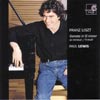Liszt Piano Sonata in B minor
The poetry and grandeur of his playing put Paul Lewis’s Liszt among the greats
View record and artist detailsRecord and Artist Details
Composer or Director: Franz Liszt
Genre:
Instrumental
Label: Harmonia Mundi
Magazine Review Date: 10/2004
Media Format: CD or Download
Media Runtime: 60
Mastering:
Stereo
DDD
Catalogue Number: HMC90 1845

Tracks:
| Composition | Artist Credit |
|---|---|
| Sonata for Piano |
Franz Liszt, Composer
Franz Liszt, Composer Paul Lewis, Piano |
| Nuages gris |
Franz Liszt, Composer
Franz Liszt, Composer Paul Lewis, Piano |
| R. W. - Venezia |
Franz Liszt, Composer
Franz Liszt, Composer Paul Lewis, Piano |
| Unstern: sinistre, disastro |
Franz Liszt, Composer
Franz Liszt, Composer Paul Lewis, Piano |
| Schlaflos, Frage und Antwort |
Franz Liszt, Composer
Franz Liszt, Composer Paul Lewis, Piano |
| (2) Lugubre gondole, Movement: 2nd version (1885) |
Franz Liszt, Composer
Franz Liszt, Composer Paul Lewis, Piano |
| (5) Kleine Klavierstücke, Movement: E |
Franz Liszt, Composer
Franz Liszt, Composer Paul Lewis, Piano |
| (5) Kleine Klavierstücke, Movement: A flat |
Franz Liszt, Composer
Franz Liszt, Composer Paul Lewis, Piano |
| (5) Kleine Klavierstücke, Movement: F sharp |
Franz Liszt, Composer
Franz Liszt, Composer Paul Lewis, Piano |
| En rêve |
Franz Liszt, Composer
Franz Liszt, Composer Paul Lewis, Piano |
Author: Bryce Morrison
Once considered musically incomprehensible and technically un- playable, the Liszt Sonata is now part of the repertoire of virtually every pianist of note. Yet even in a crowded market place (where Horowitz, Gilels, Richter, Argerich, Brendel, Pollini and others jostle for attention) Paul Lewis’s recording stands out for its breadth, mastery and shining musicianship.
Eschewing all obvious display, he concentrates on the Sonata’s monumental weight, grandeur and ever-elusive inner poetry. His sense of drama is dark and intense and his reading of the central Andante sostenuto alone puts his performance in the highest league. Lewis’s octaves in the final Prestissimo blaze before the retrospective coda are of a pulverising strength; with him the Sonata regains its stature among music’s most formidable milestones.
Moving to the music of Liszt’s final years (hardly from l’exuberance de coeur to l’amertume de Coeur as the sleeve suggests; the Sonata surely bestrides both worlds), Lewis ranges from Nuages gris, much admired by Stravinsky, its language anticipating Debussy, Bartók and even Schoenberg, to Unstern (literally, and in Shakespearean terms, ‘unstarred’), music of a sinister violence. If there is solace in the relatively benign world of the four Little Pieces and En rêve it is quickly shattered by La lugubre gondole II, a desolate elegy anticipating Wagner’s funeral.
This is not music for late-night listening, more an invitation to ‘sleepless question and answer’ (Lewis’s penultimate, nightmare offering). But these pieces are played with a rapt and haunting sense of their attenuated beauty, making this one of the finest, most intelligently planned Liszt recitals to have come my way for many years. Harmonia Mundi’s sound is of demonstration quality.
Eschewing all obvious display, he concentrates on the Sonata’s monumental weight, grandeur and ever-elusive inner poetry. His sense of drama is dark and intense and his reading of the central Andante sostenuto alone puts his performance in the highest league. Lewis’s octaves in the final Prestissimo blaze before the retrospective coda are of a pulverising strength; with him the Sonata regains its stature among music’s most formidable milestones.
Moving to the music of Liszt’s final years (hardly from l’exuberance de coeur to l’amertume de Coeur as the sleeve suggests; the Sonata surely bestrides both worlds), Lewis ranges from Nuages gris, much admired by Stravinsky, its language anticipating Debussy, Bartók and even Schoenberg, to Unstern (literally, and in Shakespearean terms, ‘unstarred’), music of a sinister violence. If there is solace in the relatively benign world of the four Little Pieces and En rêve it is quickly shattered by La lugubre gondole II, a desolate elegy anticipating Wagner’s funeral.
This is not music for late-night listening, more an invitation to ‘sleepless question and answer’ (Lewis’s penultimate, nightmare offering). But these pieces are played with a rapt and haunting sense of their attenuated beauty, making this one of the finest, most intelligently planned Liszt recitals to have come my way for many years. Harmonia Mundi’s sound is of demonstration quality.
Discover the world's largest classical music catalogue with Presto Music.

Gramophone Digital Club
- Digital Edition
- Digital Archive
- Reviews Database
- Full website access
From £8.75 / month
Subscribe
Gramophone Full Club
- Print Edition
- Digital Edition
- Digital Archive
- Reviews Database
- Full website access
From £11.00 / month
Subscribe
If you are a library, university or other organisation that would be interested in an institutional subscription to Gramophone please click here for further information.




